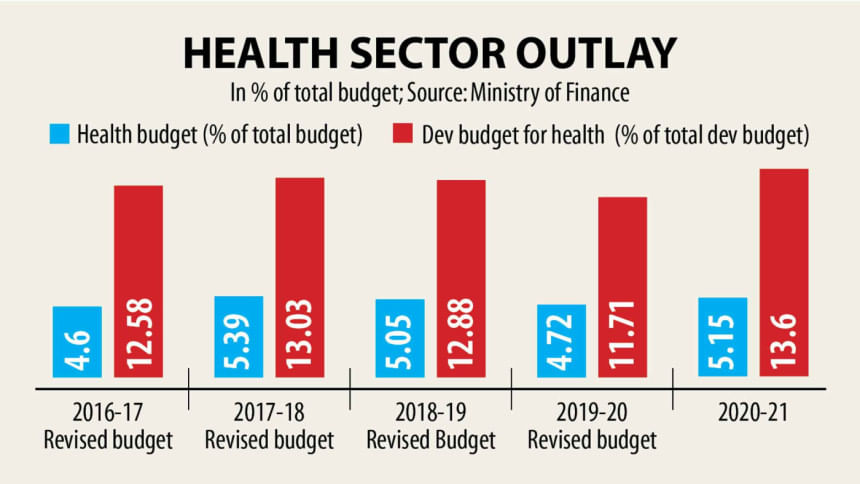Raise allocation for health, safety net

The health, education, safety net, and agriculture sectors should be on top of the priority list in the next national budget to protect the people and revive the economy from the prolonged coronavirus pandemic, said the South Asian Network for Economic Modeling (Sanem) yesterday.
"The 0.92 per cent allocation for the health sector is too low in terms of GDP and the extreme vulnerability of the sector has been exposed during the pandemic," the think-tank said.
The South Asian average expenditure in the health sector is 3.48 per cent of the gross domestic product (GDP).
The dismal picture of the health sector becomes clearer when expenditure is considered: only 28.7 per cent of the allocation was spent between July and April, the first 10 months of the outgoing budget, way below 72.3 per cent, year-on-year.
"The expenditure trend indicates the health ministry needs to improve the quality spending capacity of the allocated resources," the Sanem said.
It also described the allocation for the education sector, which is two per cent of the GDP, as meagre.
"Many poor students, especially in rural areas, could not attend online classes as they do not own laptops or smartphones."
"The upcoming budget needs to allocate a significant amount of money to the social safety net as many people lost their jobs and nearly three crore people became new poor due to the Covid-19 fallout," said Sayema Haque Bidisha, research director of Sanem.
In her keynote presentation during the pre-budget webinar styled "Budget 2021-22: Reality and Expectations", Prof Bidisha said 42 per cent of the people were living below the poverty line, which is double the 21.6 per cent in pre-pandemic times.
She said the government would need to transfer Tk 5,132.65 crore per month to pull the poor above the poverty line.
"But there is no significant programme for the new poor in the budget for fiscal 2020-21."
Bidisha, a professor of the department of economics at the University of Dhaka, said the per capita allocation of Tk 500 as an old age allowance was too insignificant. The proposed benefit of Tk 3,000 per month to the elderly aged 90 and above is yet to be implemented.
"More than 70 per cent of the elderly do not receive any kind of financial support."
The monthly Tk 500 allowance for widows and destitute women, the Tk 100 stipend for primary school students, and Tk 1,500 support for the financially insolvent disabled people are also low, according to Sanem.
Prof Bidisha called for expanding the social safety net to the urban poor as many people living in the cities slipped below the poverty line due to the ongoing crisis.
"Many have lost their jobs and small businesses that they depended on to run their families."
"So, the government should not only increase the allocation for the social safety net. The allocation should be spent in a way that generates jobs for those who lost ones for smooth recovery of the economy."
More than 68 per cent of the wage-employed in the agriculture sector saw a reduction in their income and around 73 per cent of self-employed observed a fall in production, sales, or profit, Bidisha said.
Spending in the agriculture sector was 0.45 per cent of the GDP, on average, for the last five fiscal years. 38 per cent of the wage-employed and 31 per cent self-employed in the sector experienced a contraction in income and have not recovered.
Prof Bidisha suggested the government implement the stimulus packages for the large, cottage, micro, small and medium enterprises to help them turn around.
Selim Raihan, executive director of Sanem, said the government needs to act in such a way that the economy recovers from the severe fallouts of Covid-19.
"Many European countries are recovering from the impacts of Covid-19 with the assistance of government-sponsored stimulus money."
Prof Raihan opposed the whitening of black money facility in the next budget and suggested massive reforms to curb corruption in the financial sector and misuse of budgetary funds during the implementation stage.

 For all latest news, follow The Daily Star's Google News channel.
For all latest news, follow The Daily Star's Google News channel. 



Comments